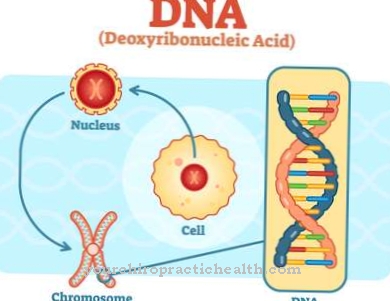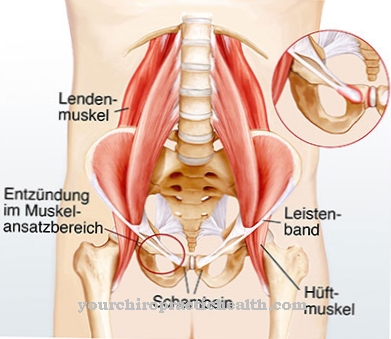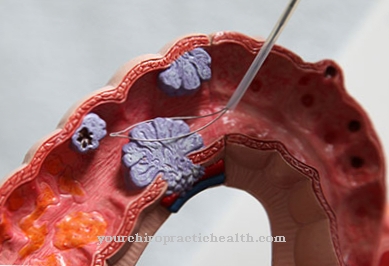The term Meconium aspiration In modern medicine, describes the so-called respiratory distress syndrome in newborns. The respiratory distress syndrome occurs immediately after the birth of the newborn and is always based on impaired lung function.
What is meconium aspiration?

© Steve Lovegrove - stock.adobe.com
In around 10 to 15 percent of all recorded births there is a so-called Meconium aspiration. Since the lungs of the newborn cannot fully develop, especially in the context of a premature birth, a so-called respiratory distress syndrome occurs.
The unborn comes into contact with the individual meconium particles in the amniotic fluid. It is not uncommon for newborns to be born unconscious. This condition requires immediate resuscitation. In most cases, however, the so-called respiratory distress syndrome only appears after several hours.
If an infection occurs during meconium aspiration, there is an acute danger to life for the newborn. Pneumonia often develops from the said infection, which in the worst case can lead to death.
causes
For the occurrence of a so-called Meconium aspiration The so-called meconium particles are largely responsible. Doctors usually use the term meconium to describe the first bowel movement of unborn babies.
Feces can pass into the amniotic fluid as early as the sixteenth week of pregnancy. Feces often pass into the amniotic fluid as part of a stressful situation. As a result of this process, the amniotic fluid usually turns green. If meconium aspiration is suspected, an extensive investigation must be undertaken.
Symptoms, ailments & signs
Meconium aspiration is a medical emergency that manifests itself as severe breathing problems, cyanosis and possibly shock symptoms. The newborn child appears limp because there is no or only a greatly reduced muscle tone. The child's breathing is barely noticeable.
It doesn't cry like normal newborns, it just whimpers. Retractions are observed on the diaphragm, jugulum, and intercostal spaces. The skin and mucous membranes are colored blue due to the lack of oxygen. The amniotic fluid is colored green at birth because it contains meconium. The child's skin is visibly smeared with mekonium.
The meconium is found in skin folds, in the ears, inside the nasal openings, and in the mouth and throat. Often the skin, umbilical cord and nails are colored green, which indicates that meconium was removed some time ago. The meconium loss can also have taken place shortly before the birth. The severity of the cardiovascular problems depends on the duration and severity of the shortness of breath.
In particularly severe cases, the child is born unconscious due to a significant prenatal oxygen deficiency. Immediate resuscitation is then required. The valve effect of the meconium leads to overinflation of the lungs and a pneumothorax.
Overstretched alveoli can rupture, with the air then entering the pulmonary connective tissue with the formation of interstitial pulmonary emphysema. This and the possible development of pneumonia due to the accumulation of meconium in the airways often creates an acutely life-threatening situation for the newborn.
Diagnosis & course
The diagnosis of a so-called Meconium aspiration takes place as part of an initial clinical examination of the child. During this examination, the child's glottis is examined, among other things. If green water is found behind the glottis, doctors speak of meconium aspiration.
A chest x-ray is considered to confirm the initial suspicion of meconium aspiration. Using the imaging technique can reveal suspicious shadows on the lungs. In most cases, the shading is limited to a specific area of the lungs. However, if the shades affect the entire lungs, modern medicine speaks of a so-called white lung.
Any pneumonia that may be present can no longer be clearly identified in this case. Meconium aspiration requires immediate and extensive therapy to avoid possible long-term effects.
Complications
As a result of meconium aspiration, newborns suffer from various ailments. In the worst case scenario, if these complaints are not dealt with, the child can die. As a rule, the child shows no signs of life or normal breathing immediately after birth. The skin and fingernails are also colored blue by the breathing difficulties. The children cannot scream either, they only whimper and appear very weak and exhausted.
As a rule, immediate treatment by a doctor is necessary for meconium aspiration in order to avoid the death of the patient or further consequential damage in adulthood. The parents or relatives of the child in particular can suffer from severe psychological complaints or from depression and anxiety due to the symptoms of meconium aspiration.
The treatment itself takes place with the help of a surgical procedure. This usually leads to success, with complications rarely occurring. The patient may be dependent on artificial ventilation. Psychological complaints of parents and relatives must also be treated, although in most cases the disease progresses positively.
When should you go to the doctor?
If the newborn child has difficulty breathing, emergency medical care must be initiated immediately so that the infant does not die suddenly. In the case of an inpatient birth, the nurses and doctors present take over the initial care of the child. You will notice the discrepancies immediately during the birth process and independently initiate the necessary steps for an adequate oxygen supply. If the birth takes place in a birthing center or a home birth is carried out, the midwife or other obstetrician will determine that the breathing activity is disrupted. You will also initiate the necessary steps for adequate care of the newborn independently and without further request.
In addition, an emergency service must be alerted and first aid measures must be taken. The parents should follow the instructions of the nursing staff and comply with their requests for action. In the event of a sudden and unplanned birth, the mother or other persons present must call an emergency doctor as soon as possible. Until the child arrives, mouth-to-mouth resuscitation must ensure that the child is supplied with oxygen. Often times, the child is born passed out. Therefore, there is an urgent need for action and emergency care is required. If the skin turns blue, there is cause for concern. The breathing activity must be checked immediately.
Treatment & Therapy
A Meconium aspiration is always treated in a so-called perinatal center. In addition to the technical equipment, the personnel equipment in a perinatal center is primarily designed for the therapy of meconium aspiration.
Depending on the severity, so-called CPAP ventilation is undertaken through the nose. As part of this therapy method, the newborn is supported in the exhalation phase by actively exerting pressure. If it is a severe respiratory distress syndrome, endotracheal intubation in conjunction with mechanical ventilation is considered. Mechanical ventilation intervenes in a supportive manner both in the inhalation phase and in the exhalation phase.
All the measures mentioned always require what is known as pulse oximetry. As part of the so-called pulse oximetry, in addition to the oxygen saturation of the blood, especially the heart rate of the child is monitored. Simultaneous monitoring of blood pressure is essential here.
Outlook & forecast
If left untreated, meconium aspiration inevitably leads to the affected person's premature death. The infant's respiratory supply is restricted, causing death. First aid measures must be used for a chance of survival. In the event of an unfavorable course of the disease, even after the acute period, a life-threatening condition and thus premature death can occur. There is an increased risk of developing pneumonia.
This needs medical care, especially for newborns, in order to ensure survival. Artificial respiration is essential for this disease. Otherwise, death occurs within a few minutes. Therefore, the general health of the child is decisive for a prognosis. It is improved when there are no other health restrictions. It must also be ensured that adequate medical care is guaranteed within a few minutes. A spontaneous birth without the presence of obstetricians gives an unfavorable prognosis.
Newborns who see the light of day in an inpatient setting have the best chance of survival. As soon as the acute phase is over and there is no pneumonia, the further course is positive. Within a short period of time, the symptoms are significantly alleviated and there is a recovery.Nevertheless, the infant's cardiovascular system should be monitored for a long period of time.
prevention
One Meconium aspiration basically cannot be actively prevented. However, the resulting respiratory distress syndrome can be treated preventively, especially in the event of a premature birth. If a premature birth is expected, doctors consider giving betamethasone.
The administration of the special preparation should actively support the lung maturation of the unborn child. In addition to betamethasone, the agent tocolysis is also used. The administration of tocolysis can in most cases postpone the time of birth.
The time gained should actively contribute to the maturation process of the lungs. In addition, extensive perinatal care and gentle induction of the upcoming birth can noticeably reduce the risk of developing respiratory distress syndrome.
Aftercare
Meconium aspiration can lead to a number of different complaints or complications, which, however, depend very much on the exact cause and also on the severity of the disease. Because treatment is relatively complex and lengthy, follow-up care also focuses on managing the disease well. Sufferers should try to focus on a positive healing process despite the adversity. To build the appropriate posture, relaxation exercises and meditation can help calm and focus the mind. This is a fundamental requirement for recovery and helps to cope with the exertion more easily. Sudden symptoms should be clarified with the doctor immediately. If recovery has largely taken place, emphasis should be placed on a healthy lifestyle that avoids stress, provides for a lot of sleep and a balanced diet to strengthen the immune system.
You can do that yourself
After the initial therapy of meconium aspiration, the parents can take various measures to support the healing process and avoid any subsequent symptoms. First of all, good monitoring of the newborn is important. If unusual symptoms appear, the family doctor must be contacted, who will carry out a further examination if necessary and prescribe an appropriate medication for the child. Since affected children are usually also physically weak, stress and exertion should be avoided.
Despite all measures, the child may be prone to asthma later in life. Parents should inform themselves about the respiratory disease at an early stage and take preparatory measures. An asthma spray and other medication are best organized preventively so that you can react quickly in the event of an initial attack.
If serious complications occur in the further course, intensive medical treatment is indicated. If the course is severe, the parents may need therapeutic support. Support groups are a great way to talk to other affected parents and share experiences. The parents can answer in a discussion with the responsible doctor and a therapist which measures are useful and necessary.













.jpg)

.jpg)
.jpg)











.jpg)